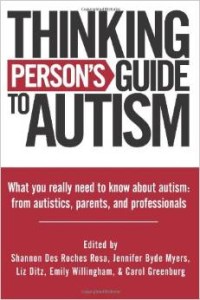It’s Autism Awareness/Acceptance Month. Excellent, because we all need more awareness and education in this area. I know I sure do. That’s why, a few weeks ago, I interviewed Shannon Des Roches Rosa, self-described “Potty-mouthed Mom” behind the blog, Squidalicious: Parenting, Autism, iPads and Geekery. Shannon’s been writing about her autistic son, Leo, and her parenting journey since 2003. She writes with a level of honesty and humor that grabs me and keeps me coming back. She talks that way too. Here’s an excerpt from our hour-long conversation about her new book The Thinking Person’s Guide to Autism.
Annie: There seem to be new books on autism coming out every week. Why did you and your co-editors (Jennifer Byde Myers and Liz Ditz) feel the need to produce yet another one?
Shannon: None of them were books we would have wanted when our kids were first diagnosed. That is, a rational, compassionate handbook that would say: What is autism? Tell me everything I need to know. What are my next steps? And how can I make good decisions? There are so many competing approaches out there. Some of them are useless at best. Others are actively harmful, like chelation, a medical procedure for removing metals from the body. And a lot of these treatments are so disrespectful to people with autism – treating them as if they’re ‘broken’ and not ‘whole’ people. And some are just so expensive for parents who don’t necessarily have a lot of money to take out a second mortgage to “cure” their child with an approach that doesn’t even have a basis in mainstream science.
Annie: What struck me from reading several of the essays in the book (there are about 50 and each is a gem), were descriptions of that parental roller coaster ride of hope and expectations, pursuing some of these treatments, followed by frustration and despair.
Shannon: In many cases, all of it for naught. What we try to do in our book is help people learn to think critically and rationally about autism even when they are in the midst of this whirlwind of new information. So many parents are so distraught when they learn their child is diagnosed with autism. We want to help them through that. And we want to let them know that even though the media tends to perceive people with autism and special needs like this lightning bolt of ‘bad luck,’ people with special needs are part of our community. They’ve always been here. This is just another way of being. These people need more understanding. Yes! They need more support. Yes! But that doesn’t make them “other” or “less than.” These are families that need compassion and understanding, but not pity. We want to help people get past fear, myths and negative stereotypes.
Annie: I just want to say, as a writer myself, that I’m a very critical reader. And in addition to the excellent information you’ve provided in The Thinking Person’s Guide to Autism, it is a wonderfully written book. It’s very readable and the tone is very reassuring. And if your goal was to share the voices of real people talking about autism with the authority of their personal experience, you have exceeded that goal. I hope you’re very proud of what you’ve accomplished. I also hope that the millions of people whose lives are touched by autism (that includes family, friends and educators) will buy your book. It’s a gift to all of us who consider ourselves to be thinking people.
Shannon: Thank you!
Annie: Thank you so much for spending time with me today and for writing this guide. I’ve learned a lot and I will continue to dip into it because I need to learn more. People often come to me with questions about autism and now I have an excellent resource to offer them. One that offers understanding and support for them and their child rather than treating their child as a ‘problem’ that needs to be ‘fixed.’
Shannon: There’s a big difference between supporting and fixing! Annie: Agreed. And that very helpful and positive perspective comes through loud and clear in your book!












